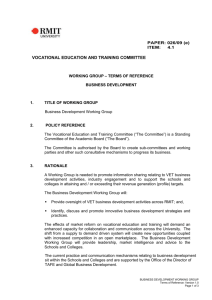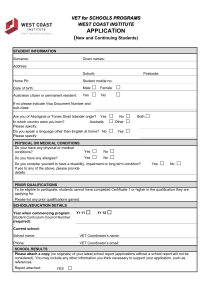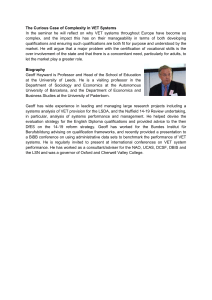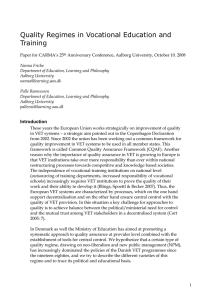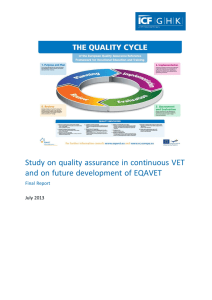10 The VET Quality Initiative – QIBB
advertisement
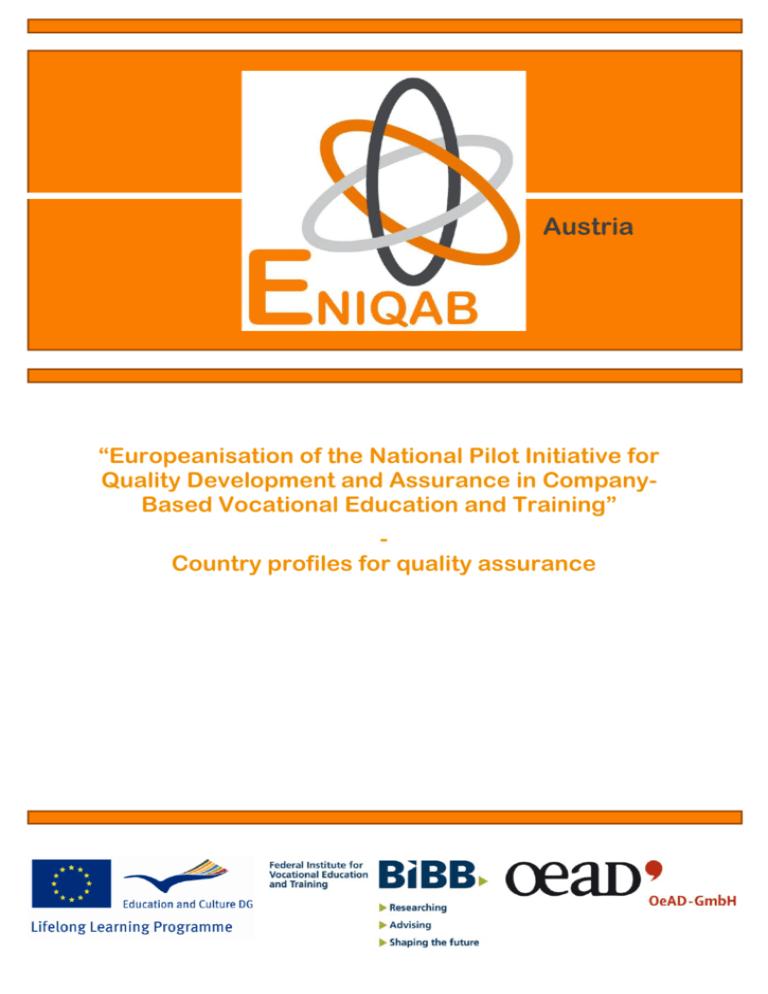
Austria “Europeanisation of the National Pilot Initiative for Quality Development and Assurance in CompanyBased Vocational Education and Training” Country profiles for quality assurance How is quality assurance in VET in general realized in Austria? Quality assurance in Austrian VET is realized in various ways depending on the sector we look at, i.e. quality assurance in IVET differs from CVET insofar as responsibilities also differ. Thus, for the IVET sector (i.e. vocational schools and colleges from the age of 14 until max. 19) the General Directorate for Vocational Education and Training (GD VET) of the Austrian Federal Ministry for Education, Arts and Culture (BMUKK) is fully responsible, whereas for the CVET sector (adult education) it is so only to a lesser extent. Here, the regions (“Bundesländer”) as well as the fact that the CVET institutions/providers are characterised by a much greater degree of autonomy than schools in the IVET sector also play a role. In Austria, CVET providers often use established quality assurance models (ISO, EFQM, LQW etc.) to prove the quality of their work. As far as the apprenticeship training in Austria is concerned (“Lehre”), responsibility for quality assurance lies both with the BMUKK (part-time vocational schools, see below) as well as with the Austrian Federal Ministry of Economy, Family and Youth (BMWFJ, see below). Since ARQA-VET (Austrian National Reference Point for Quality Assurance in VET) as one unit of the OeAD-GmbH has as one of its main tasks to support the VET Quality Initiative QIBB (short for “QualitätsInitiative BerufsBildung”) and thus especially the IVET sector, the description on this sector and initiative will be given in detail. Are there current projects or national initiatives on quality assurance? What focus do they have? The VET Quality Initiative QIBB was launched by the GD VET of the Austrian Federal Ministry (BMUKK) in 2004. The aim of QIBB as a comprehensive quality management system in Austrian VET schools and colleges is to strengthen the ownership of schools for their processes, activities, and results, as well as to improve the teaching quality and the quality of administrative services. QIBB meets the criteria of nationally and internationally recognised quality management systems for educational institutions and is carried out in coordination with European vocational education and training policies. It constitutes one element of the national strategy to implement the Recommendation of the European Parliament and of the Council on the establishment of a European Quality Assurance Reference Framework for Vocational Education and Training (EQAVET Framework), which was adopted in the context of the Copenhagen process in June 2009. QIBB corresponds to the model of the European reference framework as regards objectives, guiding principles, priorities, and structure. QIBB comprises all institutional levels of the Austrian VET school system (school/VET provider, regional, and federal level), which means some 650 schools (part-time vocational schools; schools and colleges for engineering, arts and crafts; schools and colleges of business administration; schools and colleges of social and services industries; colleges for agriculture and forestry; nursery teacher training colleges and colleges of social pedagogy) with 26.700 teachers and around 330.000 students. The basic principles are the same at all three system levels. The development process follows a continuous quality control cycle with four stages: planning and setting of objectives (1), implementation (2), evaluation and measurement (3), and analysis, assessment, reporting (4). The same instruments are applied at every level and in every educational establishment: the mission statement, the quality matrix (key processes, long-term and medium-term objectives etc.), the annual work 2 programme, the management & performance review, evaluation instruments (in 2009/10, approximately 540 schools made use of the self-evaluation platform!), and the quality report. For more information please go to: www.qibb.at. Quality assurance strongly depends on the persons in charge of quality. The Austrian VET-CERT project (i.e. one of the five EQAVET projects) therefore deals with the question as to how qualification and certification of persons can be used as a possibility of competence development for persons working in institutions of IVET and CVET in Austria. Up to now, in the appointment of management positions, qualification requirements regarding quality assurance/quality management could not be taken into consideration sufficiently. Neither are these skills/qualifications taught during the basic training of teachers and trainers. That means that there are defined functions and tasks/responsibilities, but there are (at least for IVET): no defined competence profiles for persons holding functions in relation to quality no standardised training courses nor training contents for this target group no certification processes concerning quality management functions. The concrete output and products of VET-CERT will be: the stocktaking of the current situation regarding the proposed topic in the different educational sectors (stocktaking report) module based and comprehensive competence profiles for persons holding functions in QM systems a curricular framework for the training of the different target groups a concept for the certification of persons holding quality functions after finishing the proposed trainings (including validation of prior learning). The impact envisaged will be competence development of those holding quality assurance/management functions, increasing transparency and mutual trust within different sectors of VET, and raising the image of quality assurance/management in VET itself. More information can be found on: www.vet-cert.at. In the area of apprenticeship training (where responsibility for the part-time schools lies with the BMUKK, but the responsibility for the training in firms, i.e. “betrieblicher Teil der Lehre”, lies with the BMWFJ) there have recently been a number of conferences to highlight the importance of the topic of quality assurance. An overview of current topics and activities can be found here: www.bmwfj.gv.at/Berufsausbildung/LehrlingsUndBerufsausbildung/lehrlingspakt/Sei ten/default.aspx. Regarding CVET, the recent initiative Ö-CERT needs to be mentioned. The Austrianwide quality framework regarding the recognition of quality in adult education aims to guarantee the mutual recognition of quality assurance measures of organisations between the regions as well as between the state and the regions and thereby set a measure which promotes quality for the whole Austrian adult education sector. 3 What main mechanisms or instruments exist? In QIBB, the following quality management instruments are used: ● mission statement (long-term orientation, core messages regarding function and self-image) ● quality matrix (key processes, long-term and medium-term objectives, implementation measures, results, indicators, evaluation methods) ● work programme or school programme (medium- and short-term objectives) ● review and objective-setting discussion (management & performance review) ● evaluation (individual feedback, system feedback, peer review in QIBB) ● quality report. Within the framework of QIBB, evaluation is conducted first and foremost as selfevaluation. On the one hand, the work includes individual feedback which serves to further develop the teachers’ and managers’ professional activities. On the other hand, the work covers system feedback, which serves to optimise teaching and administrative processes at organisation and system level. An internet platform is available where the evaluation instruments (questionnaires, survey grids, etc.) and tools for standardised data evaluations can be accessed. With the instrument of Peer Review an external evaluation element has been introduced within the framework of QIBB (the start was in autumn 2009). External experts, so-called peers, are invited by the VET school or college to evaluate and give feedback to the quality of selected areas of the institution. Peer Review in QIBB is an evaluation method applied to foster school quality and school development at the specific school. Peers are people who are not employed at the school which is being evaluated but who have professional expertise in the field of “VET schools and colleges”. They are invited by the school to evaluate particular quality areas defined by the school beforehand. After the peer review the school gets oral feedback and a written report from the peers. The decision to conduct a peer review is taken by the school (voluntary nature of participation!). For more information please go to: www.peer-review-in-qibb.at. In QIBB every establishment submits its quality report to the respective higher level of management. The report contains a review of the year-end situation, taking into account evaluation results and a follow-up plan with strategic and operational objectives. Agreement regarding the future development and implementation objectives of a given organisation is reached in the form of a discussion between the managerial personnel of the two responsible management levels concerned and in the form of the review and objective-setting discussion as well as the management & performance review. The introduction and implementation of QIBB is a cooperative endeavour. A crucial precondition for QIBB to be successful is the shared conviction that quality management not only means applying a bundle of specific management methods but should be understood as a management culture that can only evolve if all stakeholders participate actively in the quality process. Sources: www.qibb.at www.vet-cert.at www.bmwfj.gv.at/Berufsausbildung/LehrlingsUndBerufsausbildung/lehrlingspakt/Sei ten/default.aspx www.peer-review-in-qibb.at 4

